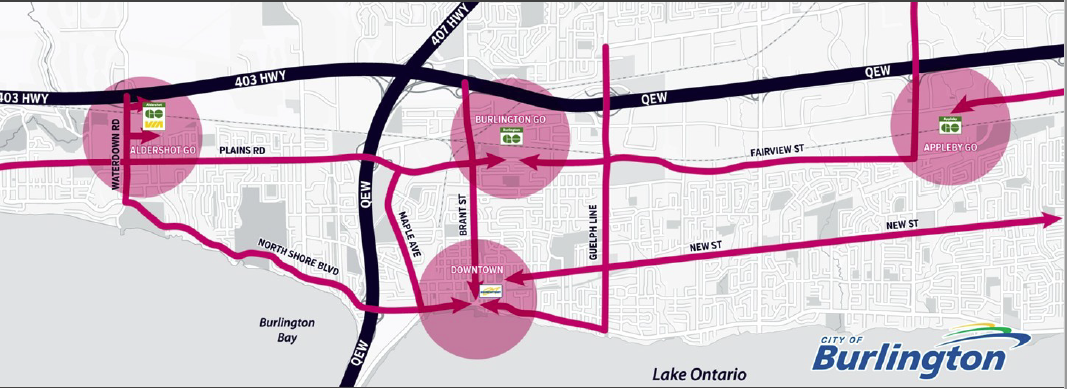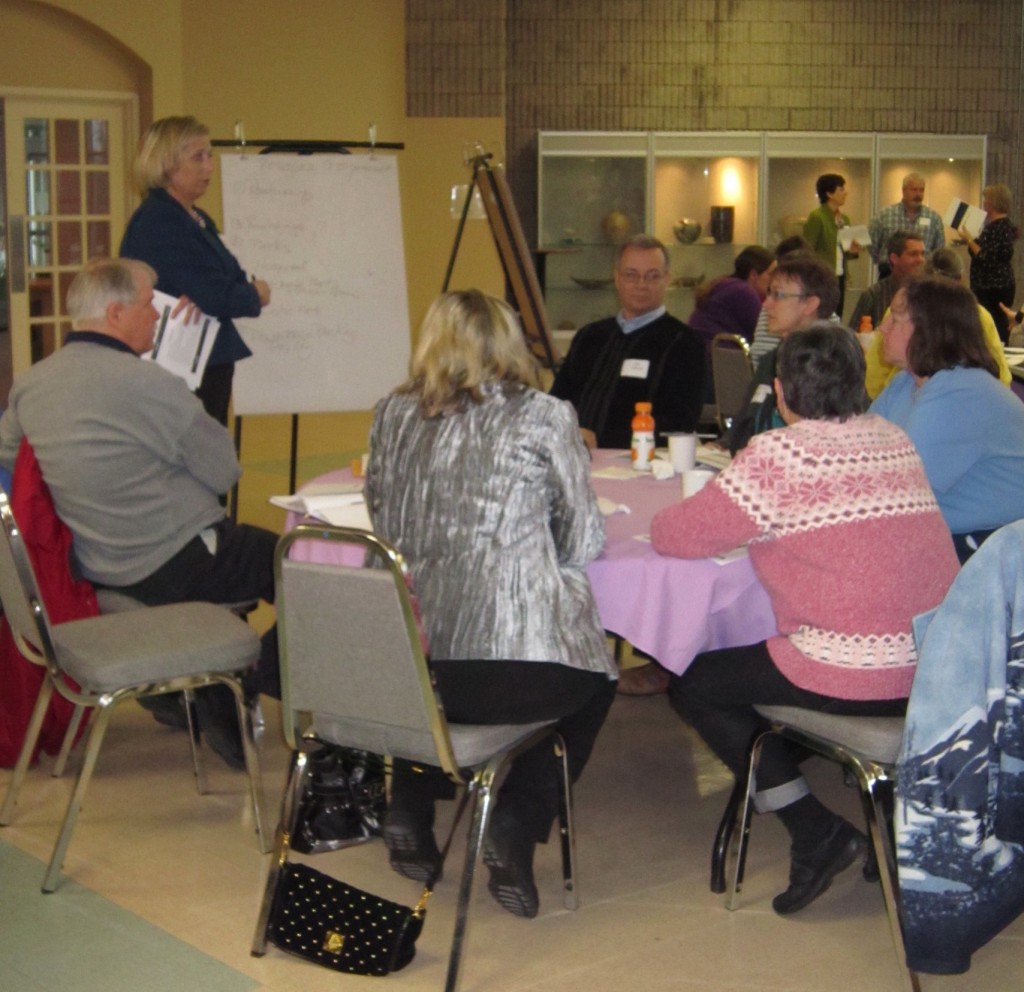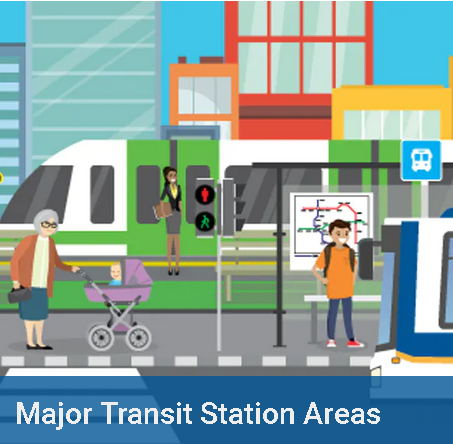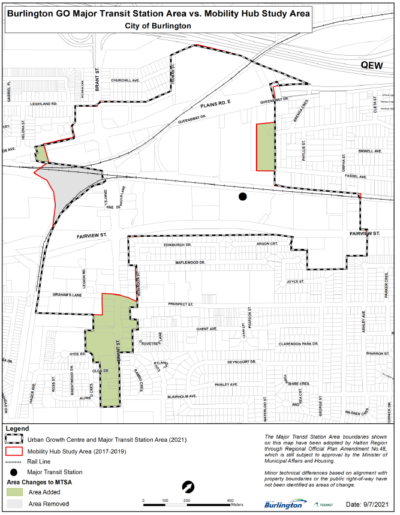 By Pepper Parr
By Pepper Parr
October 20, 2021
BURLINGTON, ON
This Background piece is on the long side. It is the first time we have seen such a comprehensive engagement plan with so much detail and really relevant information. While we are surprised we also want to thank the Communications people for being this candid.
Burlington is in the next phase of city-building as it approaches full build-out of the urban area. The undertaking of area-specific plans (ASPs) for Burlington’s Major Transit Station Area (MTSA) represents the City’s continuing implementation of its vision for appropriate intensification and the protection of established neighbourhoods by focusing future population growth to key areas, and in particular, a focus around higher order transit.

Way back in the beginning the GO stations were called Mobility Hubs and at that time the bus terminal in the downtown core was included a Hub. That mistake made it possible for a developer to put up a 26 storey tower which opened things up for other developers.
This is a big big deal – it involves something in the order of 20,000 people and or jobs in what will be a small village of its own. It will take decades to get through it all and it may well change in some form going forward.
The city has put together an Engagement Plan – it runs 13 pages long – with a lot of surprising information.
Area Specific Plans for the properties within each MTSA have to be created.
This work started out as a Mobility Hub study which was placed on hold in Q1 2019 to allow for a shift in focus to emerging planning priorities, including the Region’s Municipal Comprehensive Review, the scoped re-examination of the adopted Official Plan and the Interim Control Bylaw Land Use Study.
There are a number of key differences that resulted in significant changes to the scope and considerations of the work that had to be done including the completion of all required technical studies, further public and stakeholder engagement and the completion of three (3) area-specific plans, as well as the associated implementing Official Plan and Zoning By-Law amendments and other implementation strategies which may be required to get everything before Council.

Citizens will show up for a meeting if you make it interesting enough and promote it effectively. We will have to wait until we are out of Covid19 rules for events like this to take place
The Engagement Plan highlights the points in the process at which engagement will take place, who will be engaged, and the level of engagement. The plan also clearly defines which aspects of the process the City and public can influence throughout the discussion.
Decision Statement
At the beginning of an engagement process, it is helpful to know, “what is the decision to be made?” A decision statement clearly identifies:
• what decision needs to be made;
• who is the decision maker; and
• when the decision is required.
The decision statement for the MTSA ASP project is as follows:
“By June 2022, Burlington City Council will vote to adopt amendments to the Burlington Official Plan, 2020 to incorporate Protected Major Transit Station Area (MTSAs) area-specific plans to guide development and investment around the Burlington, Appleby and Aldershot GO Station Areas.
“Amendments adopted by Burlington City Council will then be forwarded to the Region of Halton for approval.”
Summary of Stakeholders
A stakeholder is anyone who has an interest or concern about a specific topic. To identify the stakeholders for the MTSA ASP Project, a mapping process will be used to confirm all the people who are affected by this work, those who have influence or power over the work and those that have an interest in its outcome, based on the stakeholders previously identified through the Mobility Hubs Project. It is expected that various individuals and groups will be identified across the following categories:
• Residents and resident groups (including newcomers, young families and young people) • Community organizations; special interest, advocacy, and activism groups
• Government and public service providers (internal and external) • City Advisory Committees and arms-length city agencies
• Indigenous Communities • Development industry
• Businesses and business groups • Major facilities1 within or adjacent to study areas
• Private and non-profit community service providers • Elected officials
• Media
Once the stakeholders and interested or affected individuals and groups have been confirmed, the engagement milestones in this plan will be refined to reflect the tactics and level of engagement required for each party throughout the MTSA ASP Project.
Objectives of Engagement
The following objectives provide a clear understanding of what the public engagement will strive to achieve through the community discussion about the MTSA ASP Project:
• Provide relevant information about the project, decision-making process, and how the public can provide input and feedback;
• Work with City communications and engagement staff, as well as consultants, to provide a coordinated approach to engagement, communication and evaluation of the MTSA ASPs and their implementing policies.
• Provide multiple channels for people to provide meaningful input virtually and, if possible, in-person at appropriate decision points;

The Getting Involved web site has loads of information and is the place documents are stored for quick retrieval. It takes some practice to get the hang of it all – but it works.
• Create an ongoing record of what is said during engagement opportunities and make it available to the public throughout the process, so they can track the progress of the project, including reports back to the community that highlight how feedback was or was not incorporated into the final recommendations to Council;
• Gather meaningful input from members of the community whose voices are historically underrepresented in conversations about city issues;
• Establish a project page on getinvolvedburlington.ca as the main online platform for up-to-date information about the project and upcoming engagement opportunities;
• Use clear, plain language in the delivery of the Engagement Plan to inform the public about what can and cannot be influenced through the MTSA ASP Project.
Project Stages and Engagement Milestones
At a Special Meeting of Council on June 8, 2021, City Council [modified/endorsed] the work plan for the MTSA ASP Project. The key project stages and associated engagement milestones are presented below. For each project stage, the engagement plan identifies where public input will take place, who will be involved in the engagement and what level of engagement will occur.
The strategies that will be used for public involvement in the MTSA ASP Project reflect the feedback provided to the City in the May 17, 2021 Council Workshop. Relevant feedback from related projects has also been considered, including the new Burlington Official Plan, the Scoped Re-Examination of the Downtown and the Interim Control By-Law Land Use Study. These strategies will be further refined by the MTSA ASP Project Steering Committee.
Policies and Factors That Cannot be Influenced
In every public engagement process, it is important to be aware of the things that cannot be influenced: either because they are beyond the City’s control (for example things that are required by regional or provincial policy or law), or because they are outside the scope of the project as set out in the Council-approved work plan. In discussing the Major Transit Station Area (MTSA) Area-Specific Planning (ASP) Project, the following aspects are considered ‘givens’ and will not be included in engagement activities:
1. Planning policy at the local municipal level is informed by legislation, policies and plans such as the Planning Act, Provincial Policy Statement, Growth Plan, Halton Region Official Plan, Metrolinx Regional Transportation Plan and others.
2. City Council can adopt proposed amendments to the Burlington Official Plan, but Halton Region is the designated approval authority. Halton Region may modify City-proposed amendments prior to approval and, if appealed, the approved amendments may be subject to further change through the Local Planning Appeal Tribunal, (Now named the Ontario Land Tribunal) except for PMTSA policies and zoning regulations protected from appeal under the Planning Act.
3. The proposed Area-Specific Plans and associated implementing mechanisms will be prepared for the Burlington Official Plan (2020), not the Burlington Official Plan (1997).
4. This study is focused only on the Downtown Burlington Urban Growth Centre/Burlington GO MTSA, Aldershot GO MTSA and Appleby GO MTSA. MTSA boundaries and the corresponding minimum growth targets are being set by Region of Halton through its Municipal Comprehensive Review. Draft Halton Regional Official Plan Amendment (ROPA) 48 proposes updates to the Regional Structure and includes formal boundaries for each of the MTSAs within Halton Region. Once approved by the Province, these boundaries and targets cannot be appealed.
 5. Urban Growth Centres (UGCs) are strategic growth areas that are planned for greater population and job growth and higher rates of development than other areas in the City and Region. Provincial policies set out minimum density targets for these areas, which are implemented through the Regional Official Plan, and then through the Burlington Official Plan. Draft ROPA 48 includes an adjusted boundary for the Burlington Urban Growth Centre (UGC). If approved by the Province, the adjusted UGC boundary will center around the Burlington GO Station Area.
5. Urban Growth Centres (UGCs) are strategic growth areas that are planned for greater population and job growth and higher rates of development than other areas in the City and Region. Provincial policies set out minimum density targets for these areas, which are implemented through the Regional Official Plan, and then through the Burlington Official Plan. Draft ROPA 48 includes an adjusted boundary for the Burlington Urban Growth Centre (UGC). If approved by the Province, the adjusted UGC boundary will center around the Burlington GO Station Area.
6. In 2017, a new policy framework for “Protected Major Transit Station Areas” (PMTSAs) was established in the Planning Act, R.S.O 1990. PMTSAs are a municipal tool used to support Higher Order Transit infrastructure around Major Transit Station Areas by establishing minimum density targets and transit-supportive land uses which are protected from appeal. In accordance with Planning Act section 16(16), once identified in an upper-tier municipal official plan and approved by the Province, PMTSA policies cannot be appealed.
Similarly, once implementing policies and zoning have been enacted at the lower-tier municipal level, the prescribed policies cannot be appealed.
PMTSAs may also require Inclusionary Zoning to support affordable housing objectives. Specifically, official plan policies may authorize Inclusionary Zoning by authorizing the inclusion of affordable housing units within buildings or projects containing other residential units, and by providing for the affordable housing units to be maintained as affordable housing units over time.
7. This project will refine and build upon the draft precinct plans developed through the former Mobility Hubs Study in 2018. However, as these plans were released as preliminary and were neither endorsed nor approved by City Council, they are subject to change based on further public engagement and the completion of technical studies.
8. Certain aspects of this project will be informed by the outcome of various technical studies, many of which are required by legislation and policy. These technical studies are undertaken in accordance with established criteria and completed by qualified experts.
9. The Burlington MTSAs are complex, previously developed areas with multiple landowners. The City does not have control over the speed of change related to development. Property owners decide when and if they will develop or redevelop their property.
10. The implementing Official Plan Amendments must be adopted by City Council by June 2022.
11. The implementing Zoning By-Law Amendments must be approved by City Council by December 2022.

Kwab Ako-Adjei, Director, Corporate Communications & Engagement at City of Burlington, has set out a demanding criteria for evaluating the effectiveness of the Engagement Plan. Burlingtonians haven’t seen an approach like this before.
How the City Will Collect and Respond to Feedback
Throughout the engagement process, City staff will diligently collect and record all input provided by stakeholders. All input will be recorded by theme into response tables, showing in detail how the comments were considered and how they did or did not shape the study process, the Area Specific Plan and their associated implementing Official Plan amendments recommended to Council, and why.
Evaluating the Engagement Process
Throughout the MTSA ASP Project, City staff will capture interim feedback on the engagement process through measures such as feedback/satisfaction surveys. This will allow for ongoing and incremental evaluation of engagement efforts and will support an iterative process where feedback may influence the engagement process throughout the project.
To assist in measuring how the public participation contributed to the final project decision to be made, the following will be used to evaluate the overall public participation process.
1. Once the project is complete, measure the degree to which community members felt they:
a. Understood the project’s process and its limitations
b. Understood how the feedback they provided influenced the outcome of the City Council approval.
2. Evaluate each form of engagement. How did each of the engagement approaches used help to achieve the engagement objectives?
3. Analyze how the feedback received about the forms of engagement informed new or alternative approaches to the overall public participation process as the project moved forward.
















This is an excellent work plan, and by engaging the citizens implies a commitment to follow through or explain why not in detail. Hidden in the verbiage is the fact that the Province can (and does) override anything on moment’s notice on a political whim. Citizens should be made aware of this flaw that can only be corrected by electing a government that will eliminate the evil OLT/LPAT/OMB process (a feature of municipal governance unique to Ontario). Election is coming in a few months, people!